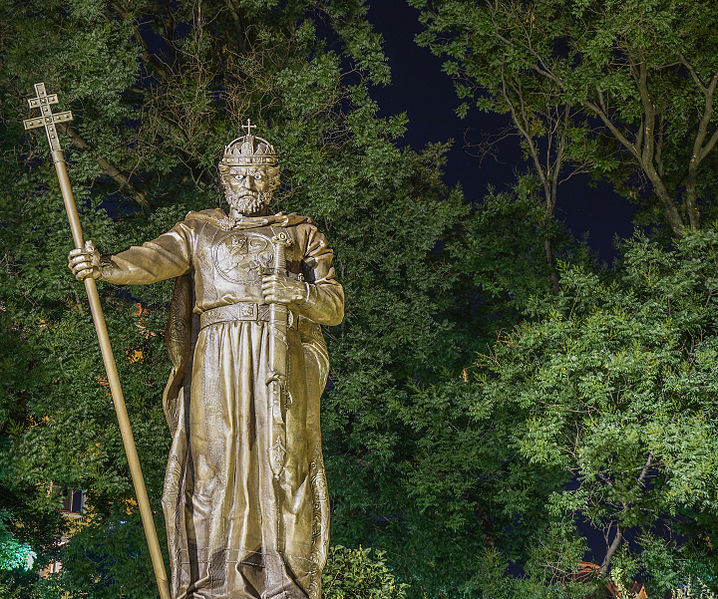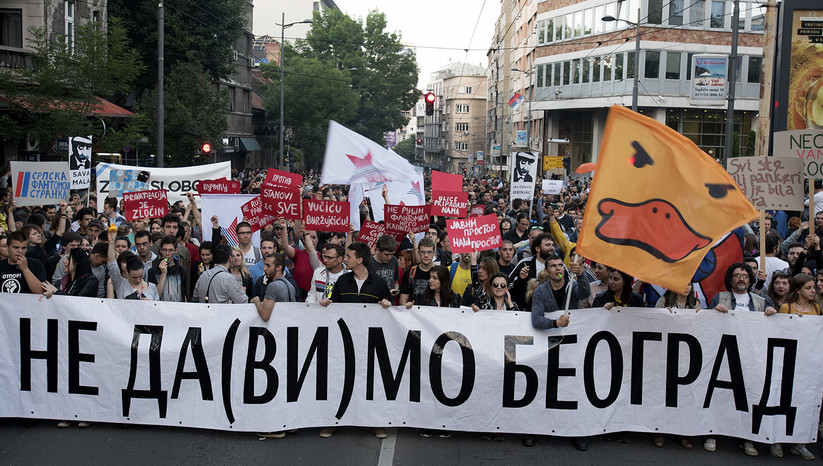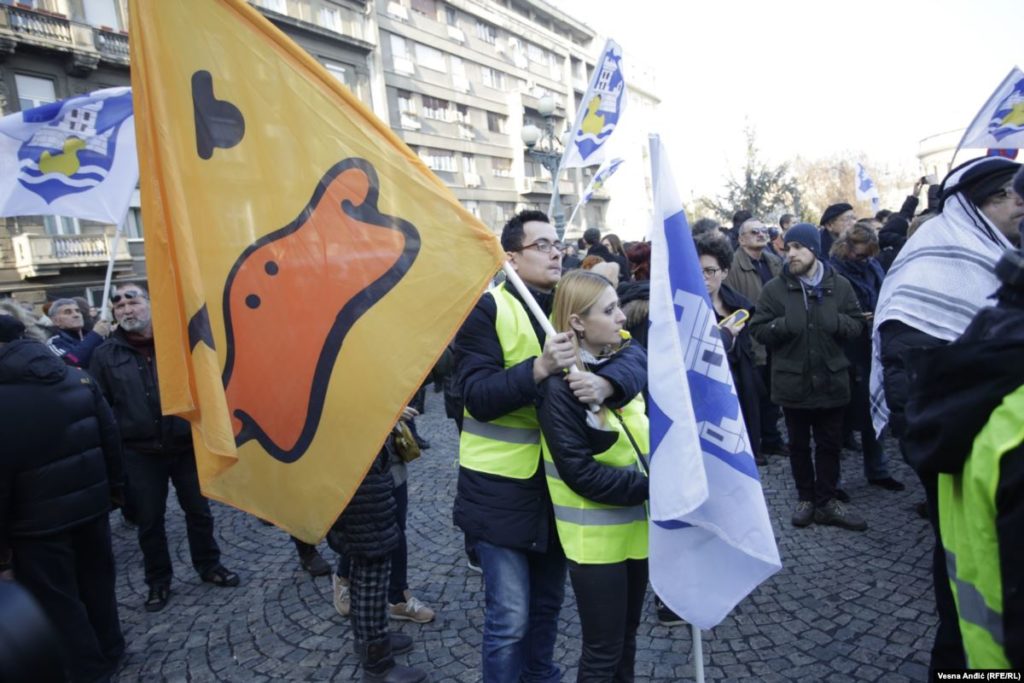Minds of the Movement
An ICNC blog on the people and power of civil resistance
by Sonja StojadinovicNovember 11, 2019
Corruption is spreading through the Balkans as countries like Bulgaria, Serbia, and Macedonia are impacted by the government-backed construction sector. Monuments, renovations, demolitions, and kitsch construction projects are being commissioned by state governments—not to create something that will last for future generations, but instead to launder money for government officials and private businesses.
This has given momentum to grassroots, unarmed resistance in each of these countries, against the backdrop of a palpable rise in authoritarianism throughout the region. Thousands of people from a variety of sectors are going beyond just nonviolent marches and creative demonstrations to denounce the corruption-induced destruction of communities. They are also organizing to build parallel institutions to support victims—and steadily gain legitimacy over corrupt officials.
A Regional Tsunami of Monuments
The monument hysteria that has consumed the Macedonian capital for the last decade was unleashed as part of a government project named Skopje 2014. To date, the project has laundered more than €560 million, but rumors abound claiming the actual amount is much higher. The official Skopje 2014 database reports that more than 130 structures have been completed since the project was first announced in 2010, altering the landscape of the entire city center.
Similar situations have been reported in neighboring Bulgaria and its capital, Sofia, where officials have ordered mass renovations to building facades in the city center. One notable monument, depicting the Tsar of Samuil with glowing eyes, received a sensational response from the public as many Bulgarians ridiculed the poor quality and uselessness of the statue.

The monument of Tsar Samuil in Sofia, Bulgaria. It spurred some controversy due to its glowing eyes, which many have found kitsch. Source: Wikimedia Commons.
Serbian Demolitions and the Plan for Belgrade on Water
Perhaps the largest money laundering project to date is taking place in Serbia under the project named Београд на води (Belgrade on Water). The project calls for mass demolition and new construction along the bank of the Sava River, including the relocation of the central train station to a nearby suburb and complete destruction of a historic area in Belgrade’s Savamala district. In its place, construction is planned for a new tower, two hotels, a shopping center, and several business and housing structures.
Since the project was enacted in 2015, only a small percentage of the plan has been realized. President Vučić guaranteed the Serbian people that it would be complete by 2020, but the contract he signed with construction companies from the United Arab Emirates later that year stipulated that the project “lasts a maximum of 30 years, of which 50 percent must be completed in the first 20.”
Belgrade on Water began under the cover of night, when masked people armed with baseball bats and diggers demolished buildings in Savamala. The demolition began in the aftermath of the 2016 parliamentary elections, when many in the area were busy counting the previous day’s votes. No arrests were made for destruction and many in the public pointed a finger at President Vučić and Sinisha Mali, the mayor of Belgrade, as responsible for the acts.

Belgrade on Water protest, May 2016. Source: Ne davimo Beograde Facebook page.

Belgrade on Water protest (2016-2018). Source: Ne davimo Beograde Facebook page.
Local Issues Provide Momentum for a Growing Resistance
The people of Belgrade were not silent in the wake of the masked destruction; thousands immediately took to the streets in protest. This year, on the third anniversary of the nighttime demolitions, thousands more marched through the city of Belgrade signaling a sustained resistance. Still today, local residents who have lived in Savamala for 40 or 50 years are being evicted from their homes to make way for the continued gentrification. Some are targeted by banks for small amounts of debt owed on water or electricity bills, and exploited by lawyers using loopholes to force people onto the streets.
Citizen groups are tackling the corruption themselves and creating parallel institutions to strengthen the movement through community support. Some are in the form of legal organizations that offer free counsel to people whose homes are endangered by the construction (or rather, destruction). Groups like За кров над главом (For Roofs over Heads), Ко гради град (Who Builds the City), Једнакост (Equality), and many others offer material support and physical protection to the people and homes threatened by forced evictions.
The membership structure of these groups is diverse, and a cross-range of individuals—from activists and academics to teachers and laborers—are coming together to oppose the violence of the state against some of the city’s most vulnerable populations.
One group, known as Не да(в)имо Београд (Don’t Drown/Give Belgrade), has grown to encompass several environmental issues threatening the Serbian capital and the riverbanks of the Sava and Danube. Since 2016, the group has organized protests and demonstrations in the city to denounce the destruction being wrought on Belgrade’s green areas and sustainable markets, the creation of illegal landfills in its suburbs, and forced evictions of long-time residents from the city. The group has loudly opposed many of the government’s most frivolous construction projects, including a new gondola from the Sava River to the Kalemegdan fortress.
A large, yellow duck with President Vučić’s face has come to serve as the mascot for the movement. The caricature is meant to shame the president and call attention to the ludicrous nature of Belgrade on Water and the entire Skopje 2014 operation.

A large, yellow duck with President Vučić’s face, a common internet meme, has become the mascot for the movement against Belgrade on Water.
The Rise of Authoritarian Rule in Eastern Europe?
Those resisting the corruption are doing so through organized nonviolent resistance, delivering speeches, standing in physical solidarity with people whose homes are threatened by demolition, and reaching out to media to generate rage over the government’s involvement in corruption of the Balkan construction sector.
And let’s not overlook the connection between the rise of authoritarian rule in the Balkans and elsewhere in Europe. State officials notice when increasingly authoritarian rule is met with little resistance in a neighboring country. They also take note when nearby leaders get away with unscrupulous political and economic decisions that enrich a small elite while bringing suffering to hundreds of thousands of ordinary people.
These trends are the very raison d’être for nonviolent resistance—a way for ordinary people to effect political change where voting and other institutional tools are failing to do so.

Sonja Stojadinovic
Sonja Stojadinovic is an MA student in Southeast European Studies at the University of Graz, Austria. She holds bachelor and master degrees in political science and international relations, both obtained on the Faculty of Law, Skopje, University of St. Cyril and Methodius, Republic of North Macedonia. She is also an activist and well-known columnist for North Macedonian daily newspapers and regional political web sites.
Read More